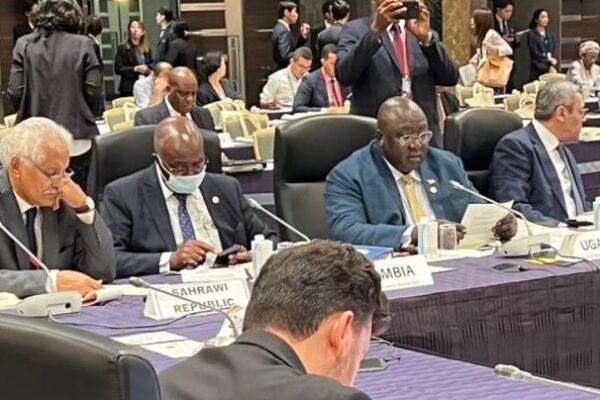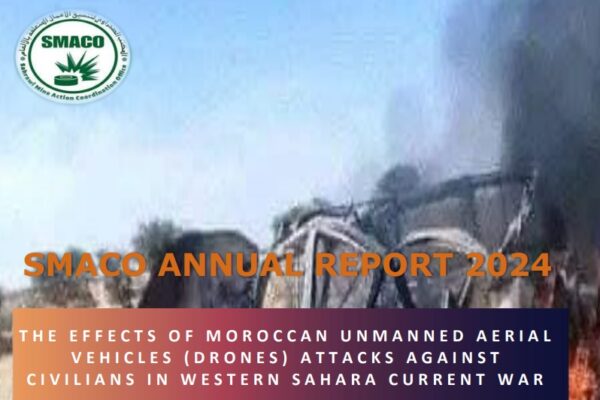World Politics Review: The U.S., France and Spain Are Deluding Themselves on Western Sahara

World Politics Review: The U.S., France and Spain Are Deluding Themselves on Western Sahara
World Politics Review published an analysis by Dr. Jacob Mundy, in which he criticized the latest positions adopted by France, Spain and the US supporting the Moroccan illegal occupation of Western Sahara, considering that this Western stance only makes the situation worse not only in Western Sahara but in the whole region and the Sahel.
Associate professor and the chair of Peace and Conflict Studies at Colgate University, Jacob Mundy, further considers that the Western powers position is unlikely to change anything in the nature of the conflict, apart from been illegal and unhelpful to the efforts of the UN and its Envoy.
Following is the full text of the Analysis published on the World Politics Review last August 13th, 2024:
Briefing North Africa
The U.S., France and Spain Are Deluding Themselves on Western Sahara
Jacob Mundy
Aug 13, 2024August 13, 2024
In late July, in a letter celebrating the 25th anniversary of Moroccan King Mohammed VI’s ascension to the throne, French President Emmanuel Macron announced that he would execute an important shift in French policy toward the long-running dispute over Western Sahara. Not only would France support Morocco’s 2007 proposal offering limited self-governance to the region as the only realistic solution to the conflict, it would from now on effectively view the contested territory as part of Morocco.
Macron is just the latest Western leader to support Rabat’s position in the 50-year-old Western Sahara dispute, which has pitted indigenous aspirations for independence against Morocco’s assertion of historical title over the former Spanish colony it invaded in 1975 and has occupied ever since. He follows then-U.S. President Donald Trump in 2020 and Spanish Prime Minister Pedro Sanchez two years ago in definitively backing Morocco’s “autonomy proposal” as the only way to end the conflict, rather than considering it one possible solution, as they had previously done through United Nations Security Council declarations.
The council is set to reexamine the issue in October, with some observers seemingly imagining that the chain reaction set off by Trump’s December 2020 proclamation, which recognized Moroccan sovereignty over Western Sahara in exchange for Rabat’s normalization of ties with Israel, will jumpstart the moribund Western Sahara peace process and move it in a new and more “realistic” direction. But for a number of reasons, little is likely to change as a result of these developments.
In fact, amid a worsening security situation across the Sahara-Sahel region, they only make matters worse, because this wave of support for Morocco has little to do with reviving the Western Sahara peace process. The real factors driving Washington’s, Madrid’s and now Paris’ shift are a mixture of transactional politics and geopolitical maneuvering in the international arena, the need to placate domestic oppositions at home and concern over the survival of an embattled Moroccan monarchy in Rabat.
Meanwhile, the Western Saharan independence movement’s right to self-determination under international law continues to be reaffirmed in almost every international legal forum where it is tested. Most recently, the July opinion of the International Court of Justice on Israel’s occupation of Palestinian territories cited the court’s own landmark 1975 opinion on Western Sahara—at the time still administered by Spain—issued mere weeks before Morocco invaded the territory to drive the Spanish out. Then, as now, the court recognized the people of Western Sahara as the territory’s true sovereign power, with the exclusive right to divest themselves of that sovereignty.
Strategically, Morocco and its allies should also remember Henry Kissinger’s famous adage: The guerrilla wins if he does not lose. For five decades, the Western Saharan nationalists, led by the Polisario Front, have lived in exile in Algeria, alongside 170,000 refugees, nearly half of the indigenous Sahrawi population. There are no indications that support for independence has flagged among a majority of Sahrawis, even as Algeria’s backing of the movement has intensified in recent years, including a renewed armed campaign after nearly 20 years in which a cease-fire held.
For the North Atlantic powers, international law and the Sahrawi refugees have been at most a mild inconvenience in their efforts to prop up the Moroccan monarchy, which has suffered an ongoing crisis of legitimacy in recent years due to its slow response to the devastating September 2023 earthquake in the High Atlas Mountains; its continued support for Israel despite the continuing devastation from the war in Gaza; and now an unprecedented nationwide drought driving costly food imports and unemployment to record levels. Support from major powers for Rabat’s annexation of Western Sahara is one of the few bright spots Mohammed VI can point to, though it matters little for the average Moroccan struggling to make ends meet.
The Western Saharan Peace Process
When it comes to conflict mediation and resolution, one strategy often employed in peace processes is to create the perception or even the reality of irreversible facts on the ground. One or all of the conflict parties are thus confronted with the choice of either getting on board or being left behind. With Spain and two permanent members of the U.N. Security Council now backing an autonomous Western Sahara under Moroccan sovereignty as the only solution to the conflict, Rabat and its supporters will be eager to suggest that there is no longer any realistic alternative, above all none that leads to Western Sahara becoming an independent state, even if it has that right under international law.
This peacemaking technique, known as “the train is leaving the station,” has been employed before in the Western Sahara conflict, often with little to show for it. The original 1991 cease-fire between Polisario and Moroccan forces was a rare case of qualified success. Rather than the armistice being a bilateral agreement as the original U.N. settlement plan of 1991 had proposed, then-U.N. Secretary-General Javier Perez de Cuellar convinced Morocco to unilaterally declare a cease-fire, leaving Polisario no choice but to follow suit or become the spoiler. But the Western Saharan independence movement only begrudgingly went along, and since then it has frequently mobilized its forces when diplomatic progress halted. The movement definitively abandoned the cease-fire in 2020 and has conducted regular bombardments of Moroccan positions ever since.
More broadly, the entire U.N. peace process, which included a requirement to organize a referendum on Western Sahara’s independence or integration with Morocco, has been a colossal failure of the “facts on the ground” approach to resolving the conflict. It was the hope of many involved that the realistic threat of a free and fair referendum polling native Western Saharans, who would in all likelihood vote overwhelmingly for independence, could be used to extract concessions from Morocco for a durable political settlement.
But the Security Council for all intents and purposes abandoned this strategy in 1999, after its disastrous experience in East Timor, where Indonesia’s violent suppression of the results of a U.N.-sponsored independence referendum necessitated a peacekeeping mission to halt a massacre and restore order. That same year, the death of Morocco’s long-ruling King Hassan II elevated the still young and untested Mohammed VI to power.
Since then, the Western Sahara peace process has lost almost all of its urgency, leaving the Security Council with no leverage over the parties apart from the threatened withdrawal of the U.N. peacekeeping mission that has been deployed there since the 1991 cease-fire went into effect. However, no one—apart from John Bolton when he briefly served as U.S. national security adviser under Trump—has suggested using this threat to influence the parties.
In the summer of 2003, James Baker—the U.N.’s lead negotiator at the time—tried to recreate a sense of unstoppable momentum when he pleaded for the Security Council to adopt his proposed compromise agreement as the only way forward. Baker had proposed a five-year trial period of robust autonomy for Western Sahara followed by a final status referendum with independence, integration or continued autonomy as the options, but with the added proviso that Moroccan settlers in the territory could vote as well, thus balancing the electorate. However, at the time, with the U.S. occupation of Iraq rapidly spiraling out of control and in the wake of the largest terror attack ever in Morocco, the Security Council had no stomach to force the parties, above all Rabat, to work within Baker’s proposed framework.
In the years since then, the mantra of the Security Council has been “the solution must come from the parties.” In 2007, Morocco proposed its plan for limited and apparently revocable local self-governance. For its part, Polisario proposed a series of political and security guarantees to Morocco for when the territory gained independence. Neither side has elaborated their proposals in any substantive way since then, nor has Morocco sought to implement its “autonomy” scheme unilaterally, which would suggest that it is in fact not a serious and credible proposal. The four U.N. mediators who have followed in Baker’s footsteps have failed to extract a single concession from either side. The current envoy, Stephan de Mistura, has yet to even bring the parties together despite almost three years on the job.
Should France and the U.S. seek to have the U.N. Security Council adopt Morocco’s autonomy proposal as the only way forward, they are likely to provoke resistance from China and, more importantly, Russia. Moscow has increasingly abstained on the council’s resolutions on Western Sahara in recent years, often citing the unilateral way in which the U.S., as the council’s “penholder” on the conflict, has pushed through resolutions with little of the consultative and consensus-based practices that used to go into council votes on Western Sahara. But this time, it could threaten a veto of any effort to change the council’s official position.
With Algeria also currently holding a nonpermanent seat on the Security Council, one would be wise to bet on the status quo holding when the world’s top political body reexamines the issue in October. That won’t necessarily change the calculus currently motivating the U.S., France and Spain in their approach to the issue. But it means little will actually change on the ground in Western Sahara.
Jacob Mundy is an associate professor and the chair of Peace and Conflict Studies at Colgate University. His book “Western Sahara War, Nationalism, and Conflict Irresolution,” co-authored with Stephen Zunes, was recently published in an updated second edition in paperback. He is also the author of “Libya,” part of Polity Press’ series on Global Hot Spots.
SOURCE: World Politics Review





